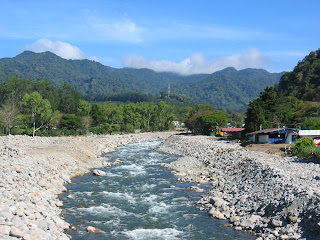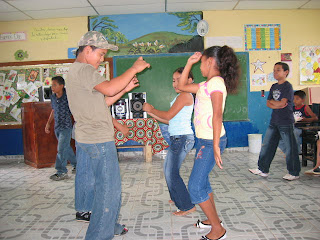
We ate our rooster Mateito for Reina's birthday, and he tasted great. It was our first experience eating an animal that we raised, but it was easy because Reina killed and cleaned him. We knew he had to go because he was getting really fat and slow. Reina made a Panamanian classic, rice and pollo guisado, which is chicken stewed in a sauce made from tomato paste, onions, peppers, garlic, and culantro. We had a nice little birthday party, even though Reina and Arturo ate after everyone else. Families almost never eat together here.
In health news, Matt's knife wound healed up nicely, gracias a Dios.
He's glad not to be among the hundreds of men with very sharp machetes harvesting the sugarcane that grows all around our town. It's smokey, dangerous work. They burn the cane to get rid of the useless leaves and drive out the snakes. Huge fires snap, crackle, and pop and billow towering plumes of black smoke. Because it hasn't rained in six weeks or so, the leaves burn right up, so the fires don't last too long. Still, the summer winds blow a steady stream of ash into all the houses here. Our floor gets covered with these long strands of charred leaves that crumble on contact with the broom. Air quality is not at its best right now.
They say burning the cane reduces the yield by a few percent, but it's worth it for the farmers because the fields grow so densely you can't work in them until they're thinned out. It makes a dirty job even dirtier, however, because the guys who have to stack and haul the burnt cane get covered in sticky grime. Many workers cover their heads and necks with shirts to keep that stuff off their skin as they carry huge loads on their shoulders.
Not all the cane gets cut by hand. The processing plant (ingenio) La Victoria has some very large tractors with big jaws cutting cane day and night. But they can't be used on uneven fields, and none of the other landowners have these machines. And even when using tractors to cut and load cane into trucks, you still need a lot of workers to run the operation and prepare the fields for next year's crop. They burn any leftover leaves, and guys with shovels fix up the ditches that drain the fields. The cane starts growing back right away, but miles of pipe has to be laid down to water the fields before the rainy season returns in several months. Tending to the pumps on our murky river and connecting all the pipes is a big job.
In the ingenio meanwhile, hundreds of people are running machines and loading trucks and taking care of business. Arturo is working six days a week operating a forklift. He works there every year from January till the end of the harvest (zafra) in March. Then, like many men here, he finds another job. In previous years he stayed with relatives and worked construction in Panama City for a while. Those jobs pay around $400 a month for new workers, which is good money. Last year, though, Arturo was hired by a European company that's surveying land way out in the countryside to provide people with titles to their property. His job was to drive their cool Nissan 4x4's into the monte and help set stuff up. The company made a video of Arturo and the crew crossing rivers, motoring up muddy hillsides, and towing other trucks out of the muck with a winch. Unfortunately, all that fun only lasted a few months, so the family's been living on whatever they saved up for a while now. That means lots of rice and soup with yucca and beans from the backyard and not much store-bought stuff.
But now Arturo's back at La Victoria, driving the forklift from 3 to 11 p.m. The plant processes sugarcane 24/7 because it costs a lot of money to shut the machines down and start 'em back up again. The plant is in the middle of nowhere (though you can see the smokestack for miles), so everyone is brought to work in old school buses. Tio Cornelio, one of Abuela's sons, and Tio Abel, one of Arturo's brothers, are two of the drivers. They get to park the yellow buses in front of their houses. Sometimes if there's a special event in Santiago, like the Virgin Mary procession in November, the sugar company lets one of the uncles drive everyone to the city for 50 cents instead of the $1.15 we usually have to pay for one of the daily mini-bus trips.
Some of the jobs inside the ingenio are year-round positions, but most of the farm work is temporary. There are not enough people around here who want to cut and pick up cane in the blistering heat, so a large percentage of the farm workers are indigenous people from the Comarca Ngäbe-Buglé. They come here with their families and live in abandoned houses or makeshift camps in the small wooded areas on the edge of town. A dozen people are camped out right now across the street from our house. They live in a little pavilion with a zinc roof and a tarp for a wall. The women cook on open fires and watch the kids all day, although we have seen at least a few kids as young as 10 heading back from the fields covered in black grime.
Obviously many of these farm families have hard lives. Cane cutters make $10 a day or less, and many of them spend a chunk of that money on liquor each Sunday. But we see many women accompany their husbands to town on these days off, which may reduce the drinking. The women wait outside the store where the men drink booze in a dingy side room with a pool table. The kids will be waiting outside too, wearing their shorts and rubber boots and drinking orange drink from little boxes. When the dads are done, they walk home with their families. Fortunately we see most of these families carrying back a week's worth of rice, sardines, and fake Spam.
The liquor of choice for people who want to get blind drunk is called seco, a clear firewater made from sugarcane in a neighboring region (the cane from our town is made into sugar that's bagged and sold in supermarkets or made into candy). Seco tastes nasty and makes you feel nastier the next day, but it's quite popular because it's dirt cheap. Some people mix it with milk or juice and drink it on ice, but most of it gets consumed straight up. A liter bottle is just a few bucks, and they sell them everywhere, including corner stores and barrooms. The main brand of seco is owned by a man who up until last week was running for president of Panama. He is now running for vice president on the ticket led by Panama's supermarket king.
Now some Peace Corps news: in two weeks we're taking two jovenes from our town, siblings Arturito and Glenny, to a week-long seminar in Chiriquí province on health, self-esteem, HIV/AIDS, and making the right decisions in life. Over 40 kids will be there, with a dozen volunteers leading educational sessions and games during the day and sports and other activities at night. We hope the participants will learn a lot and go back to their communities and be leaders among their friends. It's also a great opportunity for them to get out of their home regions, meet new people, and see a bit more of this very beautiful country. Arturito and Glenny have never been west of Santiago, so this will be an exciting trip. The seminar is run by the Peace Corps Panama Gender and Development group, which Lisa helps run as vice president.
Lisa also attended a recent two-day seminar in the mountains, where she taught small-scale coffee and vegetable growers about business. She returns to that village for two more of these sessions this month, and she's planning a similar venture for our own town with both business and agriculture volunteers. The seminars are important because almost all of the business done in Panama involves agriculture, and most of the people who work the land have not been to high school.
Matt was also busy in January editing and producing La Vaina, the Peace Corps Panama magazine. He and his friend Lee worked for several days in the PC office near the canal, which is great because of the view and the very powerful air conditioning system. The magazine can be read at the website of the organization Peace Corps Panama Friends.
Thanks for visiting our blog! And thanks again for the Christmas cards! We were especially pleased to read Gramma's lovely letter. We send our love to her and all our friends and family. Peace!
 Mateo, Adam, and Lisa hang out in the front yard. Adam is about 9 months old, and he loves to eat watermelon, which is now in season.
Mateo, Adam, and Lisa hang out in the front yard. Adam is about 9 months old, and he loves to eat watermelon, which is now in season.  Farmhands collect cut cane in the field right by our house. They have to haul it up ladders to get it into the truck.
Farmhands collect cut cane in the field right by our house. They have to haul it up ladders to get it into the truck. These workers are standing atop the truck, making sure it all fits.
These workers are standing atop the truck, making sure it all fits. This is one of the ladders they use to load the cane. Everyone here uses homemade ladders.
This is one of the ladders they use to load the cane. Everyone here uses homemade ladders.































+008.JPG)
+002.JPG)
+062.JPG)
+053.JPG)
+038.JPG)
+035.JPG)
+032.JPG)
+013.JPG)
+010.JPG)
+007.JPG)
+004.JPG)
+012.JPG)
+088.JPG)

